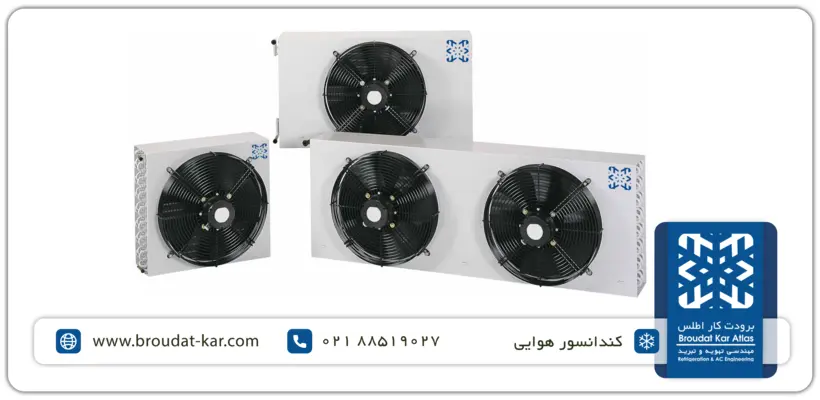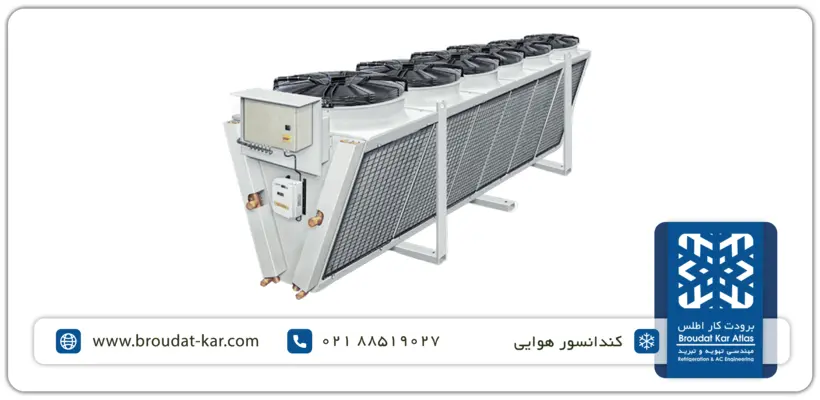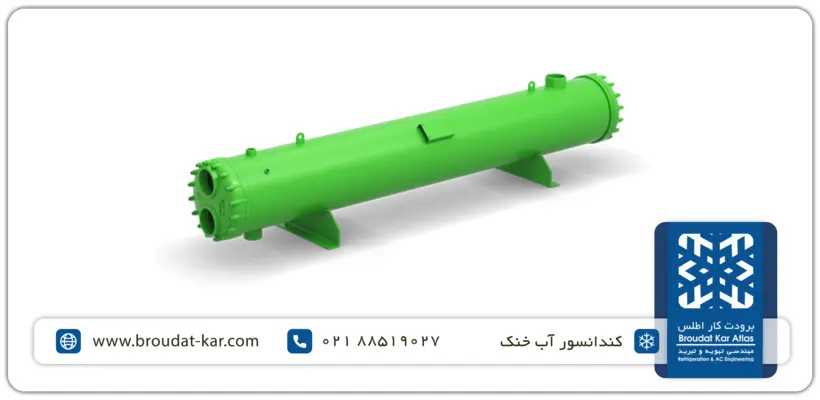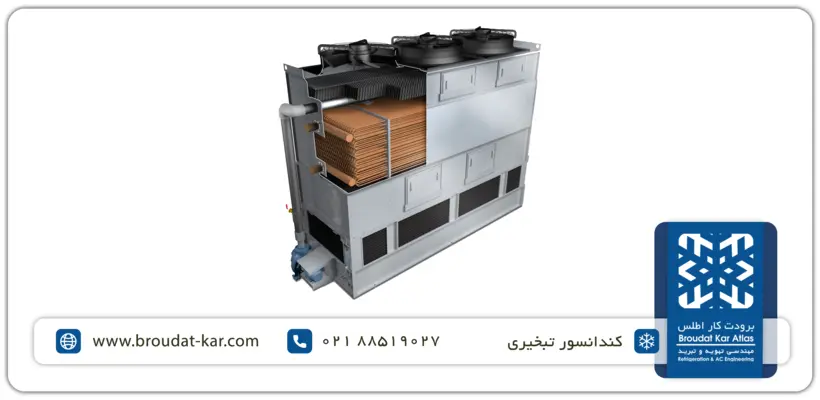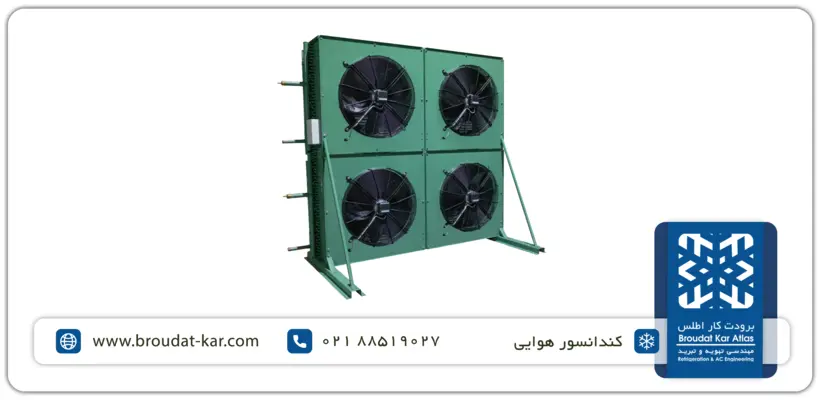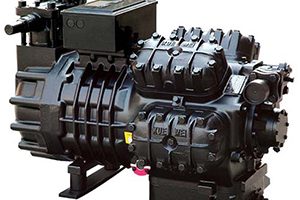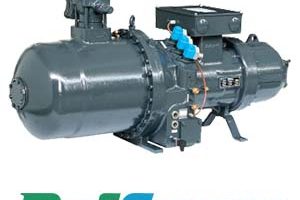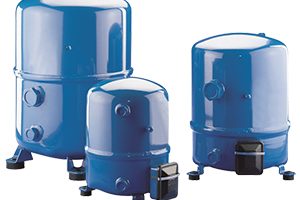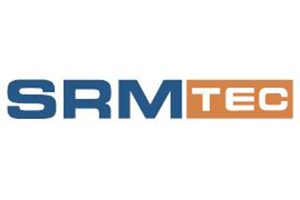Air conditioner freon condenser
The ATC series air-cooled Freon condenser with a wide range of 7 to 240 kW meets various refrigeration needs. If needed and according to the order, it is possible to design and manufacture freon condenser with required capacity.
Air-cooled Freon condenser compatible with Freon family refrigerants and suitable for air conditioning, sub-zero cold storage, above-zero cold storage, meat cold storage, chicken cold storage, fish and shrimp cold storage, fruit and vegetable cold storage, medicine storage cold storage and freezing tunnel to work in conditions The climate is mild and hot and dry with temperatures ranging from 20 to 55 degrees Celsius.
What is a freon condenser?
In simple words, the Freon condenser is one of the important parts of air conditioning systems, refrigerators, and heating and cooling systems, which is responsible for converting vapor into liquid. This process is actually an important part of the refrigeration cycle. The Freon condenser of the cold room actually removes the heat of the refrigerant and therefore changes its phase from gas to liquid.
Components of air-cooled Freon condenser
Condenser body
ATC air-cooled Freon condenser has a strong and resistant body against the effects of atmospheric and corrosion factors and is a very suitable option for use in harsh weather conditions. The body of the condenser is made of pre-galvanized iron sheet with an electrostatic paint coating, which minimizes the rate of corrosion and decay of the device. The condenser is placed on a chassis made of galvanized sheet with electrostatic paint.
Condenser coil
The air-cooled Freon condenser coil is made of copper tubes and aluminum fins with sinusoidal wave patterns. The distance between the fins and the tubes has been minimized by the mechanical expand method and the heat transfer coefficient has been significantly increased in these coils. The distance between the fins can be 3 or 4 mm. ATC Freon condenser is compatible with R507, R502, R134-A, R404-A and R22 refrigerants. Condensers are tested with nitrogen gas up to 450 psi pressure.
Condenser fan
Aeration in the air-cooled Freon condenser is done with the use of axial-type cold room reverse-cycle electrofans from Zillabag or EBM brands in Germany with the lowest possible noise. The protection class of condenser fans is IP54 and they have a one-year warranty. The diameter of the fans is chosen from 30 to 63 cm according to the capacity of each condenser. Also, the electrical specifications of the fans are 380v/50Hz or 220v/50Hz, which are installed in the distribution box installed on the body of the condenser.
Condenser accessories
- A receiver tank according to the capacity is installed under the air-cooled freon condenser.
- One receiver valve is considered according to the size of the liquid line.
- Adjustable bases are installed on the chassis to install the compressor.
Design and manufacture of air-cooled Freon condenser based on standards
- American standard ARI 460-2000 on the subject of air-cooled condensers with forced air circulation
American National Standard ANSI/ASHRAE 1997-20 on methods of measuring the capacity of air-cooled condensers with forced air circulation
- ENV 327 European standard on the subject of testing air-cooled condensers with forced air circulation
How to choose an air-cooled Freon condenser
To choose a condenser, you should use the following relationship and tables.
QN = QD × CC × CR
QD = Q + PC
QN = nominal capacity of the condenser
Q = evaporator capacity (refrigerating power of the compressor at the corresponding operating temperature)
QD = required heat dissipation capacity
CC = capacitance correction factor
CR = Refrigerant correction factor
PC = compressor power consumption
Δθ = difference between distillation temperature and ambient temperature
Example: In a cold store where the required refrigeration power is 2.9 kW and the compressor power consumption is 1.8 kW and the refrigerant gas is R-22 and the distillation temperature is 40 degrees Celsius and the ambient temperature is 32 degrees Celsius.
QD=Q+PC=1.8+9.2=11 CR=1
CC = 1.89
QN=11×1.89×1=20.79
Therefore, ATC-500-1 model condenser is suitable for this cold store.
Correction table for the temperature difference between the condenser and the environment.
| Capacity Correction Coefficient | |||||||
| (Temperature Difference (°C | |||||||
| 20 | 17 | 15 | 12 | 10 | 8 | 6 | (Δθ(°C |
| 0/75 | 0/88 | 1 | 1/25 | 1/49 | 1/89 | 2/50 | Cc |
Compressor refrigerant type correction table
| Refrigerant Correction Coefficient | CR | |
| Correction Coefficient | Refrigerant | |
| 1/00 | R-22 | |
| 0/98 | R-404A | |
| 1/03 | R-134A | |
Freon condenser types
In general, the types of Freon condensers can be divided into different categories. In the following, we explain the main types of Freon condensers and their characteristics.
Air-Cooled Condenser
This type of condenser removes Freon heat using air. It usually consists of copper tubes with expanded aluminum fins through which air passes (with the help of a fan) and removes heat from the freon. Freon air condenser is used in small systems such as commercial refrigerators, home air conditioners and air conditioner units.
Among the advantages of this condenser, the following can be mentioned:
It does not need water and is suitable in low water areas.
It is easier to install and maintain.
Water-Cooled Condenser
Water cooled condenser or water freon condenser uses water as cooling fluid. This condenser is usually used in larger systems such as industrial refrigerators, cold water chillers and industrial air conditioners.
Advantages of water condenser:
- It has better efficiency in heat removal than air-cooled condensers.
- Occupies less space.
Evaporative Condenser
Another type of Freon condenser is the evaporative type. This type of condenser is a combination of water-cooled and air-cooled condenser. In this system, freon flows in the pipes and then some water is sprayed on the pipes. Part of this water evaporates due to the air flow of the fan and removes the heat from the freon.
Among the advantages of the evaporative condenser, the following can be mentioned:
- It has high efficiency and can work well in high temperature conditions.
- It has higher efficiency than air-cooled condensers.
What are the characteristics of Freon condenser?
The main features of the Freon condenser are:
- Effective heat transfer: Freon condenser must have a high heat transfer capability in order to quickly remove excess heat from Freon.
- Heat transfer coefficient: The material and design of the condenser must be such as to guarantee a high heat transfer coefficient.
- Air or water refrigerant: The condenser can use air or water as the cooling fluid, which greatly affects its design and performance.
- Compact and lightweight: Freon condensers should be designed to take up little space and weigh less, especially in small systems.
- Appropriate design for heat exchange: use of fins and suitable tubes to increase the contact surface with the cooling fluid.
- Corrosion resistance: The materials used in the construction of the condenser must be resistant to corrosion and rust, especially in humid conditions.
- Durability and long life: Freon condenser should be designed to be able to work over time without the need for frequent repairs.
- Resistance to high pressure: it must have the ability to work at high pressures and different temperatures.
Ease of installation: The design should be such that the installation of the condenser is easy and does not require special tools.
- Noise reduction: In the design of the condenser, attention should be paid to minimizing the noise caused by the operation of the fan or pumps, so as not to cause disturbance in quiet environments such as residential or office.
How does a Freon condenser work?
The operation of Freon condenser is basically similar to other condensers of refrigeration cycles. At first, after being compressed by the compressor, the refrigerant gas enters the refrigerator’s Freon condenser at a high temperature. This gas has a lot of energy that must be removed from the refrigeration system of the cold store. For this reason, the Freon condenser is designed in such a way that there is a large contact surface between the refrigerant gas and the cooling fluid such as water or air.
When the high-temperature refrigerant passes through the condenser tubes and comes into contact with the cooling fluid, heat transfer takes place. In this process, the refrigerant gas transfers its heat to the cooling fluid. As heat is lost, the temperature of the refrigerant gas decreases and reaches the dew point. At this point, the refrigerant gas begins to change phase from gaseous to liquid. After that, it leaves the condenser and enters the next part of the refrigeration cycle.
Freon condenser price list
The price of a Freon condenser is influenced by several factors that can significantly affect the final purchase cost. Among these factors, we can mention the type of condenser, capacity and size, construction materials, brand and quality, as well as the type of seller and market conditions. If you are looking for an economical and affordable purchase of Freon condensers, “Brodt Kar Atlas” offers you the best brands with a valid warranty and a reasonable price.
In addition, you can also benefit from free expert advice before purchasing. To start the purchase process, you can request the price list of the Freon condenser from the official website and through the communication channels of the Atlas Refrigeration site.
What are the advantages and disadvantages of Freon condenser?
The following table shows the advantages and disadvantages of Freon condensers.
| Advantages | Disadvantages |
| High energy efficiency and reduced energy consumption | Requires regular maintenance to maintain performance |
| Reliable performance and long life | Relatively high initial installation cost |
| High flexibility and ability to adapt to different applications | The effect of some old freon refrigerants on the environment (but newer refrigerants are less harmful) |
Important points in buying a Freon condenser
Choosing the right Freon condenser for your refrigeration or air conditioning system is an important decision that affects the performance, efficiency and longevity of your system. Below are some important points to consider when buying a Freon condenser.
Nominal capacity of the condenser
This characteristic indicates the amount of heat that the condenser can remove. Condenser capacity should match the power of the compressor motor and the cooling load of your system.
System cooling load
Before buying a condenser, you should calculate the exact cooling load of your system so that you can choose a condenser with the right capacity.
Cool or blue air
Air-cooled condensers use air to cool the refrigerant, while water-cooled condensers use water. Choosing the type of condenser depends on factors such as weather, available space and costs.
The type of pipes
The type of condenser tubes (copper, aluminum) and the type of fins (smooth, wavy) affect heat transfer and corrosion resistance.
conclusion
Finally, choosing the most appropriate type of Freon condenser can have a significant impact on the efficiency and performance of your refrigeration and air conditioning systems. Considering the pros and cons of each type of condenser, including air-cooled, water-cooled, and evaporative condensers, you can choose the best option based on your specific needs.
If you are looking for expert advice on the purchase and installation of a Freon condenser, our experts at “Atlas Refrigeration” are ready to help you. For more information and a free consultation, contact us now!
Several factors, including the type of application (industrial or commercial), required thermal capacity, environmental conditions, initial costs and the need for maintenance and repairs, influence the choice of Freon condenser.
To increase the efficiency of the Freon condenser, there is a need for regular maintenance, cleaning of fins and pipes, use of quality refrigerants, and optimization of the cooling system design. Also, installing automated control systems can help improve performance.
Related posts
Freon Condenser
Refrigeration Compressors from Leading American, European, and Asian Brands Refrigeration compressors are essential components of cold room systems, available in
Refcamp compressor Refcamp was founded in 1991 as a refrigeration compressor manufacturer in Italy. Refcamp’s production facilities are equipped with
Danfoss Compressors: A Legacy of Excellence The renowned Danfoss compressors, originally pioneered by Maneurop, have been at the forefront of
What Is Ammonia Screw Compressor? An ammonia screw compressor is a type of compressor used in industrial refrigeration systems to
